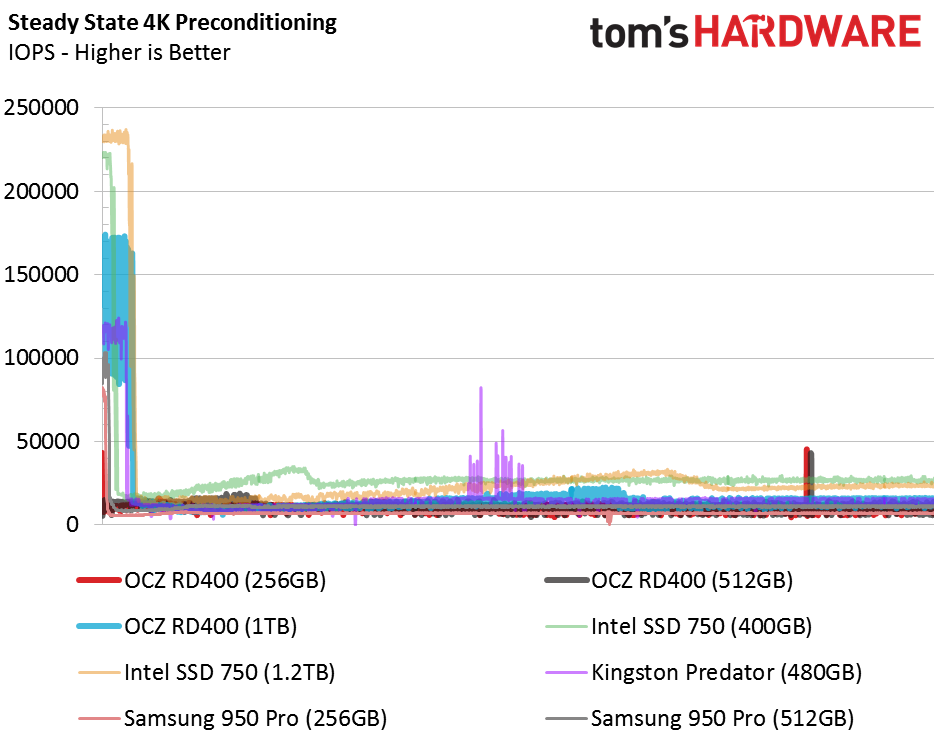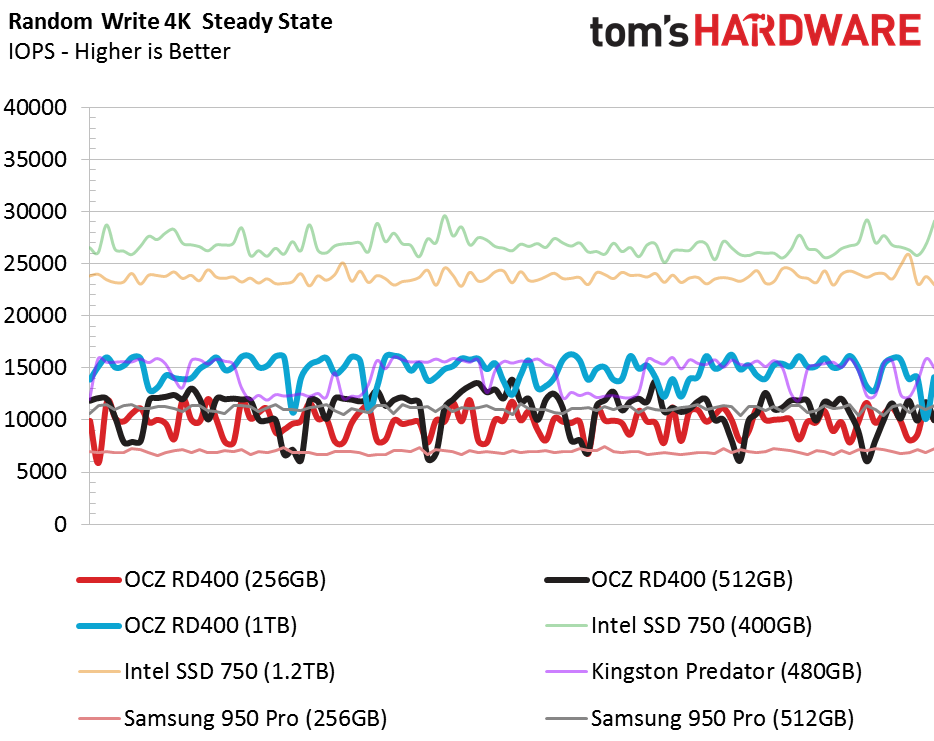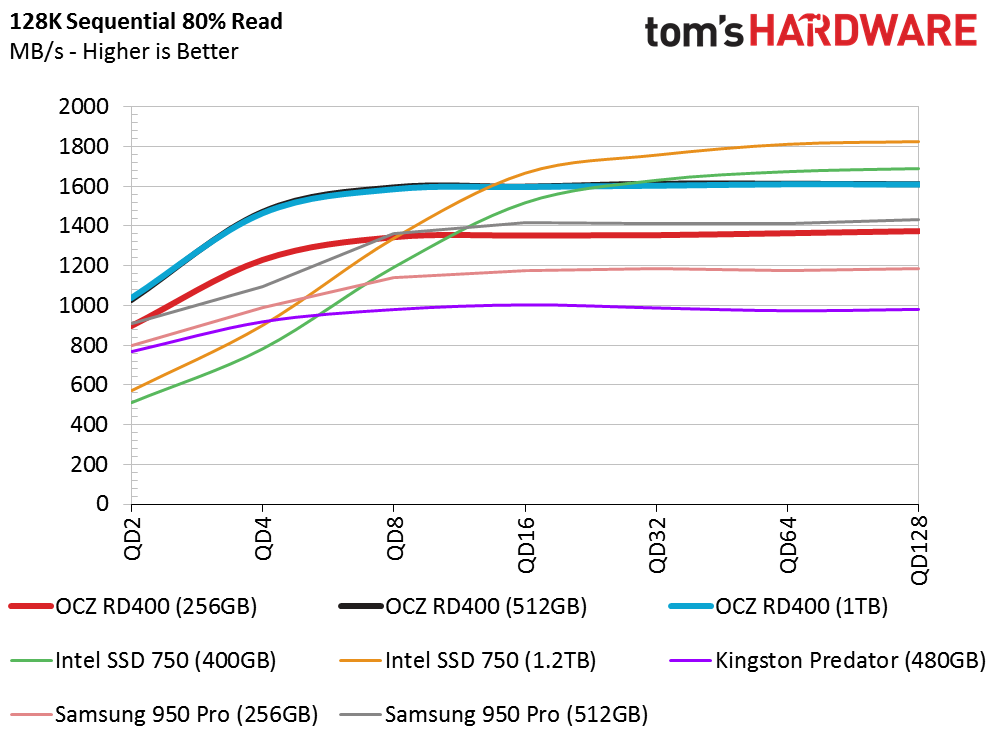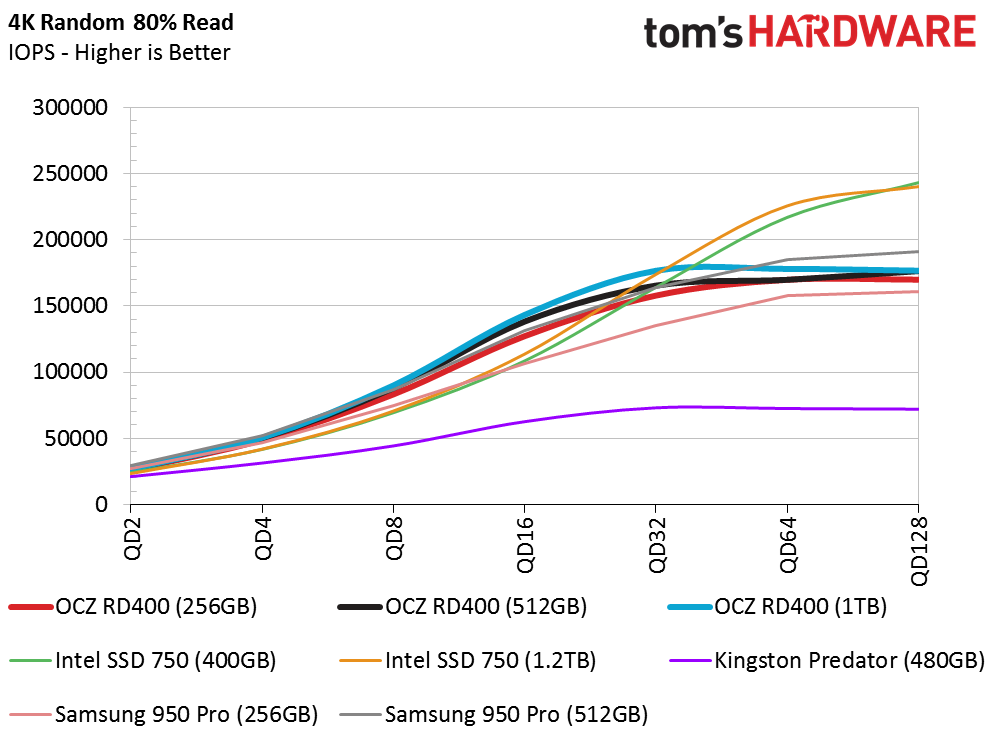OCZ RD400 NVMe SSD Review
Why you can trust Tom's Hardware
Mixed Workloads And Steady State
80 Percent Sequential Mixed Workload
We describe our mixed workload testing in detail here, and describe our steady state tests here.
We place heavy emphasis on mixed workload performance measurements. An operating system drive rarely just reads or writes data, at any given time tens to hundreds of small update operations are taking place. An SSD works much harder than you can imagine, even when it appears to be idle.
The OCZ RD400 SSDs all deliver higher sequential mixed workload performance than the other products on the chart at a queue depth of 2. The RD400 products move more data than other SSDs at a queue depth of 4, but at queue depth 8 and 16 the Intel SSD 750 products catch up. The Samsung 950 Pro 512 GB delivers nearly identical performance to the RD400 256 GB.
80 Percent Random Mixed Workload
All seven NVMe-protocol SSDs provide nearly identical mixed workload performance at QD 2 and 4. The OCZ and Samsung products stand out when we move up the scale to queue depth 8 and 16. The Intel SSD 750 products scale better at high queue depths. Intel based the SSD 750 on its enterprise SSDs, which it designed for heavy database workloads at very high queue depths, so it is not surprising to see it outperform the M.2 SSDs at high queue depth loads.
Sequential Steady-State
The RD400 products deliver two tiers of performance based on capacity. The large 1TB model outperforms the two smaller capacity sizes in steady-state conditions with sequential read data. OCZ's specifications state that the 512GB RD400 delivers higher sequential write performance, which shone through in the sequential steady-state test.
Random Steady-State


The first chart illustrates the SSD preconditioning phase and the second chart highlights the final 100 seconds of the 4 KB random steady state test. We are looking for a high level of performance with the least amount of performance variation, as a high number of drives in a RAID array can amplify performance peaks and valleys.
The Samsung 950 Pro 256 GB delivers the most consistent performance, but does so with less performance than the other products. The Intel SSD 750 SSDs deliver higher steady-state performance, but exhibit more variability during the test. The SSD 750 products deliver the best balance of the two factors we examine.
Get Tom's Hardware's best news and in-depth reviews, straight to your inbox.
The Samsung and OCZ drives fall in the middle with high steady state write performance, but also experience the most variability. Normally, we would not oppose using the RD400 in RAID 0 on an Intel Z170 chipset PCH, but the RD400 products do not work properly with the Intel drivers that enable such a configuration. It is unclear if Toshiba / OCZ will work with Intel to resolve the issue, or how long it will take.
The RD400 delivers very high performance and we would like to see what the RD400 is capable of in RAID 0 and RAID 5 using Intel's RAID settings.
Current page: Mixed Workloads And Steady State
Prev Page Four-Corner Performance Testing Next Page Real-World Software Performance
Chris Ramseyer was a senior contributing editor for Tom's Hardware. He tested and reviewed consumer storage.
-
2Be_or_Not2Be I believe Toshiba should just kill the OCZ brand name. As the author mentions, a lot of people have bad reactions to OCZ products. For every user who had good memories, there are at least 3-4 others who don't. So make a clean break - kill the OCZ brand name & either create a new one or just use Toshiba.Reply -
CaedenV ReplyI believe Toshiba should just kill the OCZ brand name. As the author mentions, a lot of people have bad reactions to OCZ products. For every user who had good memories, there are at least 3-4 others who don't. So make a clean break - kill the OCZ brand name & either create a new one or just use Toshiba.
I mean... have you ever used a Toshiba laptop? You think people have bad memories of OCZ! At least the OCZ issues only poisoned the cheap enthusiast market. Toshiba's own bad name is far more broad reaching. -
CaedenV My own expierence with OCZ was hit and miss. Their great products were fantastic and cheap, while their crap was really truly crap. 3-4 years ago when I was upgrading to SSDs I bought all OCZ products simple because there was nothing else that was affordable at the time. A lot of their gen2 products were pretty scarry, but their 3rd gen Agility lineup was pretty reliable, and came in much MUCH cheaper than anyone else. I had a Solid 2 and Agility 2 that died on me, which were replaced by an Agility 3 and Vertex 3 (both under warranty). So my expierence was not too terrible.Reply
But then again, you get what you pay for. Any time a new tech comes in that much cheaper than the competition you have to expect failures.
Not to mention, some of their PSUs were fantastic! After they bought PC Power & Cooling you could get essentially a PCnP PSU for $50 less as an OCZ rebrand! I have a 750W 80+Silver OCZ rebrand and it has been running 24/7 for almost 5 years without so much as a hiccup! Granted, their in-house OCZ PSUs were crap... but that's why you do a bit of research before buying. -
2Be_or_Not2Be ReplyI believe Toshiba should just kill the OCZ brand name. As the author mentions, a lot of people have bad reactions to OCZ products. For every user who had good memories, there are at least 3-4 others who don't. So make a clean break - kill the OCZ brand name & either create a new one or just use Toshiba.
I mean... have you ever used a Toshiba laptop? You think people have bad memories of OCZ! At least the OCZ issues only poisoned the cheap enthusiast market. Toshiba's own bad name is far more broad reaching.
So you're saying you would go for the new brand name option. ;)
Actually, I have used several Satellite Pro laptops back in the day; they weren't too bad. Even you really want to go back, I've used Toshiba FDDs (floppy disk drives) w/no problems. I also have a number of Toshiba enterprise drives, both HDD and SSD. So I guess for me, Toshiba has much better brand equity in my mind than OCZ. -
erendofe the only thing I bought of OCZ was a 2 power supplies (700W)... I guess its kinda hard to completely screw them up because both work great. must be luckyReply -
3ogdy "We, and other sites, notice the proliferation of negativity about OCZ in the comments section of every OCZ news post or product review. Undoubtedly, even before reading beyond this point, some are already reaching for their keyboards to pen a chilling tale of a poor product, support or warranty issue.Reply
In the past, OCZ would flaunt a prototype fresh off the production line at a trade show and we would see retail products within a few months. Times have changed and OCZ is now part of Toshiba, which is renowned for its extensive testing, longer development cycles and true tier 1 status."
I'm glad people like you are aware of this. I'm sad people like OCZ might not be. Well, after how successful they ended up being (/irony) they probably know it too.
How about making this cursed name disappear from the market? It just doesn't matter if Toshiba, Samsung, Microsoft, Bill Gates the man himself, God or an alien aliance bought OCZ. We all remember how they treated their customers and how disastrous their products were. I'm gonna stop talking about it here because you ALL know what's up with OCZ. Toshiba, be smart about it...get rid of that name.
It seems very strange that they decided to put their tech under that crappy brand's hood and market those when they already knew what the problem was. Buying one of those products was like buying a lottery ticket.
Dog gamn, even dictionaries from the Roman era had taken notice of this lousy company's products before they went downhil. I'm surprised there are no comments on how OCZ would destroy their own products through the release of updates that bricked their customers' drives for free? (do I see a pattern here? Oh...right, it's OCZ) l:
-
crenwelge I got great customer service out of OCZ, they promptly replaced an SSD for me that I mistakenly thought was bad. Turns out, the problem was with my Asrock hardware. Asrock is either the stupidest or most dishonest company I've ever dealt with. After 5 RMA's I finally gave up on Asrock. I diagnosed and paid for a replacement out of my own pocket.Reply -
Virtual_Singularity The listed numbers look promising for the RD400, no doubt. It may be worth noting that of the top 3 performers we see in the charts, only Samsung at least offers a basic level of data security via their AES 256-bit for User Data Encryption. I thought Intel's 750 series would surely at least include the same, and was a tad surprised to find out they don't.Reply -
LordConrad I have two Vertex 2 drives and one Vertex 3, and never had any problems with them.Reply
I prefer Samsung drives these days because of the V-NAND endurance but the RD400 is a good drive, I would buy one if the price was right.

